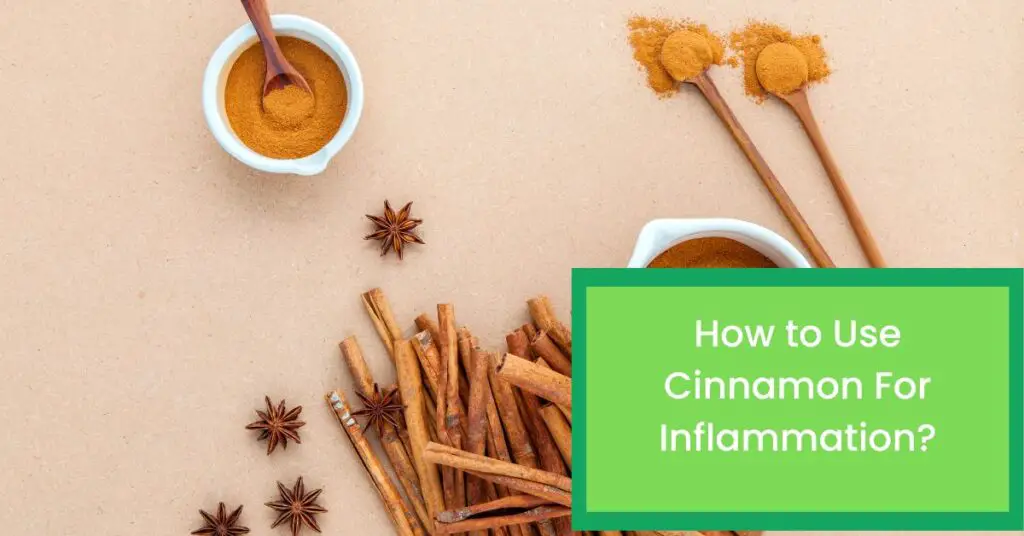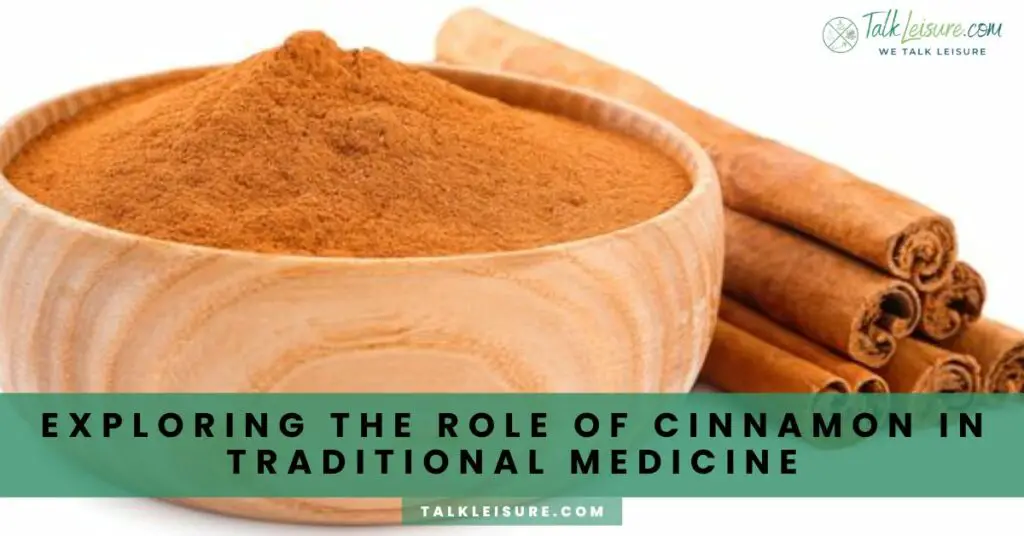Inflammation is the body’s response to injury or infection. However, sometimes inflammation can become chronic, lasting for weeks, months, or even years.
There are a number of things you can do to reduce inflammation. Some simple lifestyle changes, such as exercising regularly, eating a healthy diet, and getting enough sleep, can help.
However, there is a common finding that cinnamon can help reduce inflammation. Therefore, most people wonder how to use cinnamon for inflammation.
To keep it simple, parallel to all other practices you follow to reduce inflammation, all you need to do is add cinnamon to your daily meal routine at a quite higher level recommended by your doctor.
Want to find out more about using cinnamon for inflammation?
Read this article to learn more about how cinnamon work in the human body, inflammation, its effectiveness of cinnamon on inflammation, and different way to consume cinnamon for inflammation.
You will also learn about the amount of cinnamon to consume, the side effects of excessive cinnamon use, and some other ways that reduce Inflammation.
SCHOLAR: https://www.sciencedirect.com/science/article/pii/S2225411016300670
How Does Cinnamon Works in Human Body?
Cinnamon has been used for centuries in traditional medicine to treat a variety of ailments.
Modern science is now beginning to unravel the mechanisms behind these traditional uses, and cinnamon is being studied for its potential role in treating everything from diabetes to Alzheimer’s disease.
So how does this aromatic spice work in the human body?
Cinnamon’s active ingredient is a group of compounds known as cinnamaldehyde, cinnamic acid, and cinnamate. These compounds have been shown to have antioxidant, anti-inflammatory, antimicrobial, and even anticancer effects in laboratory studies.
When it comes to diabetes, cinnamon has been shown to improve blood sugar control by helping the body to better utilize insulin. In one study, cinnamon was even found to be more effective than the diabetes drug metformin in reducing blood sugar levels and improving insulin sensitivity.
Cinnamon may also help to lower cholesterol levels and protect against heart disease. In one study, people who took cinnamon supplements for 12 weeks had lower levels of total cholesterol, LDL (“bad”) cholesterol, and triglycerides than those who didn’t take cinnamon.
Cinnamon has also been shown to improve cognitive function and protect against Alzheimer’s disease in animal studies.
The antioxidant and anti-inflammatory effects of cinnamon may help to reduce the inflammation and oxidative stress that are thought to contribute to the development of Alzheimer’s disease.
There is already some evidence that this spice can have a powerful impact on our health. So go ahead and add a little extra cinnamon to your breakfast cereal or afternoon cup of coffee – it just might be good for you!
What is Inflammation?
In medicine, inflammation is part of the complex biological response of body tissues to harmful stimuli, such as pathogens, damaged cells, or irritants. It is a protective attempt by the body to remove the injurious stimuli and begin the healing process.
Inflammation can be classified into two main types: acute and chronic. Acute inflammation is the initial response of the body to harmful stimuli and is achieved by a complex series of biochemical events mediated by cells, proteins, and other mediators.
The mediators of acute inflammation include histamine, bradykinin, and prostaglandins. These mediators increase the permeability of capillaries, which allows leukocytes (white blood cells) and fluid to escape from the blood and into the tissues. The leukocytes then engulf and destroy the pathogens or damaged cells.
The resulting increase in tissue fluid pressure causes pain and swelling at the site of injury. The process of acute inflammation is usually self-limiting and resolves once the injurious stimuli have been removed.
Chronic inflammation, on the other hand, is a low-grade inflammatory response that persists over a long period. It is characterized by the presence of activated leukocytes, especially macrophages and lymphocytes, in the affected tissues.
The main difference between acute and chronic inflammation is the duration of the inflammatory response. Acute inflammation is of short duration, while chronic inflammation may last for weeks, months, or even years.
Chronic inflammation is often associated with the development of various diseases, such as rheumatoid arthritis, Crohn’s disease, and cancer. Treatment of chronic inflammation usually requires the use of drugs that suppress the immune response.
In conclusion, inflammation is a complex biological response of the body to harmful stimuli.
How is Cinnamon Effective Against Inflammation?
Some studies have shown that cinnamon may be effective against inflammation. Inflammation is a response of the body to injury or infection. It is characterized by redness, swelling, and pain.
The active ingredient in cinnamon is called cinnamaldehyde. This compound has anti-inflammatory properties. It works by inhibiting the production of inflammatory cytokines and by reducing the activity of immune cells. Cinnamon also has antioxidant and antimicrobial properties.
This spice contains antioxidants that scavenge harmful free radicals. This action helps to protect cells and reduce inflammation. Cinnamon also has antimicrobial activity. It can kill bacteria, fungi, and viruses. This action may help to reduce the risk of infections.
Cinnamon is a safe and effective way to reduce inflammation. It can be used in cooking or taken as a supplement. Consult with a healthcare provider before taking cinnamon supplements.
Some Effective Ways to Use Cinnamon For Inflammation
Cinnamon is a spice that has been used for centuries in traditional medicine. It has a long history of use in treating many different medical conditions, including inflammation.
Cinnamon can be consumed in many different ways. It can be added to food or drinks or taken in supplement form.
Here are some effective ways to use cinnamon for inflammation:
1. Add Ground Cinamon Over Prepared Foods:
One of the simplest ways to consume cinnamon is to add a teaspoon of ground cinnamon over prepared foods. This can be done with oatmeal, yogurt, or even rice.
2. Use Cinnamon Quills in Tea:
Cinnamon quills can also be used to make a delicious and soothing cup of tea. Simply add a cinnamon quill to hot water and let it steep for 5-10 minutes.
3. Take Cinnamon Supplements:
If you want to get the most out of cinnamon, consider taking it in supplement form. There are many different supplements available, so be sure to talk to your doctor or pharmacist about which one would be right for you.
4. Drink Cinnamon Water:
You can also make cinnamon water by adding a few cinnamon sticks to a pitcher of water and letting it sit for a few hours. This makes a great refreshing drink that can help to reduce inflammation.
5. Swallow Ground Cinnamon With Honey:
Another way to consume cinnamon is to mix a teaspoon of ground cinnamon with honey and swallow it. This combination can help to soothe the throat and reduce inflammation.
If you are looking for a natural way to reduce inflammation, try adding cinnamon to your diet. These are just a few of the many ways that you can use this spice to your advantage.
YOUTUBE: https://www.youtube.com/watch?v=e3cnRvNpiN0
How to Consume Cinnamon in Moderation
A healthy person generally should consume is 1 gram (or about 1 teaspoon). That’s the recommended safe amount of cinnamon to consume each day.
So go ahead and enjoy cinnamon in your favourite recipes or sprinkled on top of your morning oatmeal. Just be sure to keep it within the recommended amount, and you’ll be reaping all the health benefits cinnamon has to offer!
Potential Side Effects of Excessive Cinnamon Consumption
While cinnamon is generally safe for most people to consume, there are some potential side effects that you should be aware of if you consume too much.
Excessive cinnamon consumption can lead to gastrointestinal upset, including nausea, vomiting, and diarrhea. It can also cause mouth sores and irritation. If you have a history of allergies, you may be more likely to experience an allergic reaction to cinnamon. Symptoms of an allergic reaction include hives, difficulty breathing, and swelling of the face, lips, tongue, or throat.
If you experience any of these symptoms after consuming cinnamon, it is important to seek medical attention immediately. Cinnamon can also interact with certain medications, so be sure to talk to your doctor before using it if you are taking any medications.
Other Effective Methods to Reduce Inflammation
There are many methods that can be used to reduce inflammation. Some of these methods are more effective than others. Here are a few effective methods to reduce inflammation:
1. Eat anti-inflammatory foods.
Certain foods have anti-inflammatory properties that can help to reduce inflammation. These include foods like salmon, turmeric, ginger, and green leafy vegetables.
2. Exercise regularly.
Exercise is a great way to reduce inflammation. It helps to increase blood flow and reduce stress hormones that can contribute to inflammation.
3. Get enough sleep.
Sleep is important for overall health, including reducing inflammation. Lack of sleep can increase inflammation-causing hormones in the body.
4. Take supplements.
There are a number of supplements that can help to reduce inflammation. These include omega-3 fatty acids, curcumin, and ginger.
5. Try natural remedies.
There are many natural remedies that can help to reduce inflammation. These include apple cider vinegar, ginger, and turmeric.
These are just a few of the many effective methods to reduce inflammation. Try incorporating these methods into your daily routine to help reduce inflammation and improve your overall health.
YOUTUBE: https://www.youtube.com/watch?v=Fxz6ZPxrXFM
Frequently Asked Questions Related to Using Cinnamon For Inflammation
1. How much cinnamon should I take to reduce inflammation?
It’s 1 to 6 grams of cinnamon per day may help to reduce inflammation.
Cinnamon is a popular spice that has been shown to have anti-inflammatory properties. It can be taken in powder or capsule form, and the recommended dosage varies depending on the condition being treated. In general, 1 to 6 grams of cinnamon per day is recommended for reducing inflammation.
2. What is the best way to take cinnamon?
There are a few different ways to take cinnamon, the most popular being adding it to food or drinking it as a tea.
However, some people find that they don’t absorb the nutrients as well when they eat or drink it this way.
The best way to take cinnamon is by taking cinnamon pills. This way you know you’re getting the right dosage and you’re also more likely to absorb all of the nutrients.
3. What happens if you drink cinnamon water everyday?
Yes, drinking cinnamon water everyday is a great way to speed up your metabolism and suppress your appetite. Cinnamon is a natural spice that has been shown to have many health benefits, including weight loss.
Cinnamon contains a compound called cinnamaldehyde which helps to increase your metabolic rate and burn more calories. It also helps to suppress your appetite, making it easier to stick to a healthy diet. So drink up!












